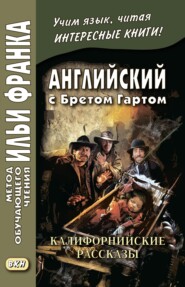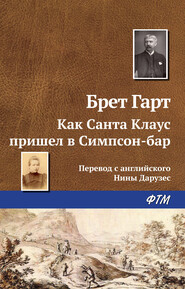По всем вопросам обращайтесь на: info@litportal.ru
(©) 2003-2024.
✖
Gabriel Conroy
Автор
Год написания книги
2017
Настройки чтения
Размер шрифта
Высота строк
Поля
"And you?"
"Oh, I'll look around here – I suppose there's not much beyond this?"
"No; the next claim is Gabriel Conroy's."
"Not much account, I reckon?"
"No? It pays him grub!"
"Well, dine with me at three o'clock, when and where you choose – you know best. Invite whom you like. Good-bye!" And the great man's escort, thus dismissed, departed, lost in admiration of the decisive promptitude and liberality of his guest.
Left to himself, the stranger turned his footsteps in the direction of Gabriel Conroy's claim. Had he been an admirer of Nature, or accessible to any of those influences which a contemplation of wild scenery is apt to produce in weaker humanity, he would have been awed by the gradual transition of a pastoral landscape to one of uncouth heroics. In a few minutes he had left the belt of sheltering pines and entered upon the ascent of a shadowless, scorched, and blistered mountain, that here and there in places of vegetation had put on the excrescences of scoria, or a singular eruption of crust, that, breaking beneath his feet in slippery grey powder, made his footing difficult and uncertain. Had he been possessed of a scientific eye, he would have noted here and there the evidences of volcanic action, in the sudden depressions, the abrupt elevations, the marks of disruption and upheaval, and the river-like flow of débris that protruded a black tongue into the valley below. But I am constrained to believe the stranger's dominant impression was simply one of heat. Half-way up the ascent he took off his coat and wiped his forehead with his handkerchief. Nevertheless, certain peculiarities in his modes of progression showed him to be not unfamiliar with mountain travel. Two or three times during the ascent he stopped, and, facing about, carefully resurveyed the path beneath him. Slight as was the action, it was the unfailing sign of the mountaineer, who recognised that the other side of the mountain was as yet an undetermined quantity, and was prepared to retrace his steps if necessary. At the summit he paused and looked around him.
Immediately at his feet the Gulch which gave its name to the settlement, and from which the golden harvest was gathered, broadened into a thickly wooded valley. Its quivering depths were suffused by the incense of odorous gums and balms liberated by the fierce heat of the noonday sun that rose to his face in soft, tremulous waves, and filled the air with its heated spices. Through a gap in the cañon to the west, a faint, scarcely-distinguishable line of cloud indicated the coast range. North and south, higher hills arose heavily terraced with straight colonnades of pines, that made the vast black monolith on which he stood appear blacker and barer by contrast. Higher hills to the east – one or two peaks – and between them in the sunlight odd-looking, indistinct, vacant intervals – blanks in the landscape as yet not filled in with colour or expression. Yet the stranger knew them to be snow, and for a few moments seemed fascinated – gazing at them with a fixed eye and rigid mouth, until, with an effort, he tore himself away.
Scattered over the summit were numerous holes that appeared to have been recently sunk. In one of them the stranger picked up a fragment of the crumbled rock, and examined it carelessly. Then he slowly descended the gentler slope towards the west, in the direction of a claim wherein his quick eye had discovered a man at work. A walk of a few moments brought him to the bank of red clay, the heap of tailings, the wooden sluice-box, and the pan and shovel which constituted the appurtenances of an ordinary claim. As he approached nearer, the workman rose from the bank over which he was bending, and leaning on his pick, turned his face to the new-comer. His broad, athletic figure, his heavy blonde beard, and serious, perplexed eyes, were unmistakable. It was Gabriel Conroy.
"How are ye?" said the stranger, briskly extending a hand, which Gabriel took mechanically. "You're looking well! Recollect you, but you don't recollect me. Eh?" He laughed curtly, in a fashion as short and business-like as his speech, and then fixed his eyes rather impatiently on the hesitating Gabriel.
Gabriel could only stare, and struggle with a tide of thick-coming remembrances. He looked around him; the sun was beating down on the old familiar objects, everything was unchanged – and yet this face, this voice.
"I am here on a matter of business," continued the stranger briskly, dismissing the question of recognition as one unessential to the business on hand – "and – what have you got to propose?" He leaned lightly against the bank and supported himself by thrusting Gabriel's pickaxe against the bank, as he waited a reply.
"It's Peter Dumphy," said Gabriel, in a awe-stricken voice.
"Yes. You recollect me now! Thought you would. It's five years and over – ain't it? Rough times them, Gabriel – warn't they? Eh! But you're lookin' well – doin' well, too. Hey? Well – what do you propose to do about this claim? Haven't made up your mind – hey? Come then – I'll make a proposition. First, I suppose your title's all right, hey?"
It was so evident from Gabriel's dazed manner that, apart from his astonishment at meeting Peter Dumphy, he did not know what he was talking about, that Dumphy paused.
"It's about these specimens," he added, eyeing Gabriel keenly, "the specimens you sent me."
"Wot specimens?" said Gabriel vaguely, still lost in the past.
"The ones your wife sent me – all the same thing, you know."
"But it ain't," said Gabriel, with his old truthful directness. "You better talk to her 'bout thet. Thet's her look-out. I reckon now she did say suthin'," continued Gabriel, meditatively, "about sendin' rock to Frisco to be tested, but I didn't somehow get to take an interest in it. Leastways, it's her funeral. You'd better see her."
It was Mr. Dumphy's turn to be perplexed. In his perfect misapprehension of the character of the man before him, he saw only skilful business evasion under the guise of simplicity. He remembered, moreover, that in the earlier days of his prosperity as Dumphy and Jenkins, Commission Merchants, he was himself in the habit of referring customers with whom he was not ready to treat, to Jenkins, very much as he had just now been referred to Mrs. Conroy.
"Of course," he said briskly; "only I thought I'd save time, which is short with me to-day, by coming directly to you. May not have time to see her. But you can write."
"Thet's so," said Gabriel, "p'r'aps it's just as well in the long run. Ef ye don't see her, she'll know it ain't your fault. I'll let on that much to her." And having disposed of this unimportant feature of the interview, he continued, "Ye haven't heard nought o' Grace – ye mind Grace? Dumphy! – a purty little girl ez was with me up thar. Ye ain't heerd anything o' her – nor seen her, may be – hev you?"
Of course this question at such a moment was to Mr. Dumphy susceptible of only one meaning. It was that Mrs. Conroy had confessed everything to Gabriel, and that he wished to use Dumphy's complicity in the deceit as a lever in future business transactions. Mr. Dumphy felt he had to deal with two consummate actors – one of whom was a natural hypocrite. For the first time in his life he was impatient of evil. We never admire truth and sincerity so highly as when we find it wanting in an adversary.
"Ran off with some fellow, didn't she? Yes, I remember. You won't see her again. It's just as well for you! I'd call her dead, anyway."
Although Dumphy was convinced that Gabriel's interest in the fate of his sister was hypocritical, he was not above a Christian hope that this might wound a brother's feelings. He turned to go.
"Can't you come back this way and hev a little talk about ol' times?" said Gabriel, warming toward Dumphy under the magic of old associations, and ignoring with provoking unconsciousness the sting of his last speech. "There's Olly ez 'ud jest admire to see ye. Ye mind Olly? – the baby, Grace's little sister, growed a fine likely gal now. See yer," continued Gabriel with sudden energy, putting down his pick and shovel, "I'll jess go over thar with ye now."
"No! no!" said Dumphy quickly. "Busy! Can't! 'Nother time! Good-day; see you again some time. So long!" and he hurriedly departed, retracing his steps until the claim and its possessor were lost in the intervening foliage.
Then he paused, hesitated, and then striking across the summit of the hill, made his way boldly to Gabriel's cottage.
Either Mrs. Conroy was expecting him, or had detected him coming through the woods, for she opened the door to him and took him into her little parlour with a graciousness of demeanour and an elaboration of toilet that would have been dangerous to any other man. But, like most men with a deservedly bad reputation among women, Mr. Dumphy always rigidly separated any weakness of gallantly from his business.
"Here only for a few moments. Sorry can't stay longer. You're looking well!" said Mr. Dumphy.
Mrs. Conroy said she had not expected the pleasure of a personal interview; Mr. Dumphy must be so busy always.
"Yes. But I like to bring good news myself. The specimens you sent have been assayed by first-class, reliable men. They'll do. No gold – but eighty per cent silver. Hey! P'r'aps you expected it."
But Mr. Dumphy could see plainly from Mrs. Conroy's eager face that she had not expected it.
"Silver," she gasped – "eighty per cent!"
He was mystified, but relieved. It was evident that she had not consulted anybody else, and that he was first on the ground. So he said curtly —
"What do you propose?"
"I don't know," began the lady. "I haven't thought" —
"Exactly!" interrupted Dumphy. "Haven't got any proposition. Excuse me – but" (taking out his watch) "time's nearly up. Look here. Eighty per cent's big thing! But silver mine takes gold mine to run it. All expense first – no profit till you get down. Works, smelting – cost twenty per cent. Here's my proposition. Put whole thing in joint-stock company; 100 shares; five millions capital. You take fifty shares. I'll take twenty-five – dispose of other twenty-five as I can. How's that? Hey? You can't say! Well – think of it!"
But all Mrs. Conroy could think of was two and a half millions! It stared at her, stretching its gigantic ciphers across the room. It blazed in golden letters on cheques, – it rose on glittering piles of silver coin to the ceiling of the parlour. Yet she turned to him with a haggard face, and said —
"But this – this money – is only in prospective."
"Cash your draft for the sum ten minutes after the stock's issued. That's business."
With this certainty Mrs. Conroy recovered herself.
"I will talk – with – my husband," she said.
Mr. Dumphy smiled – palpably, openly, and shamelessly. Mrs. Conroy coloured quickly, but not from the consciousness Mr. Dumphy attributed to her, of detected cunning. She had begun to be ashamed of the position she believed she occupied in this man's eyes, and fearful that he should have discovered her husband's indifference to her.
"I've already seen him," said Mr. Dumphy quietly.
The colour dropped from Mrs. Conroy's cheeks.
"He knows nothing of this," she said faintly.
"Of course," said Dumphy half contemptuously, "he said so; referred to you. That's all right. That's business."
"You did not tell him – you dared not" – she said excitedly.
Mr. Dumphy looked curiously at her for a moment. Then he rose and shut the door.

















